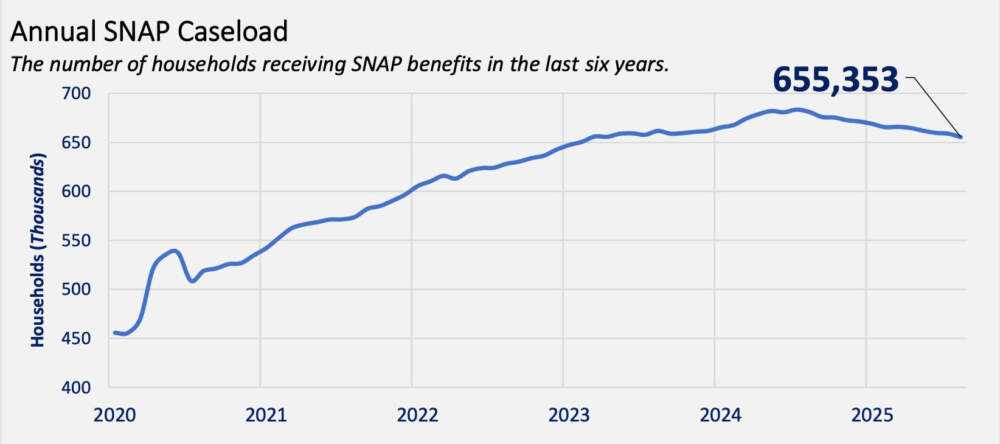By the numbers: Who will be affected in Mass. if food aid program SNAP goes unfunded
October 29, 2025

A customer shops for groceries in West Roxbury in 2019. (Jesse Costa/WBUR File)
The country’s largest food assistance program is set to lapse on Nov. 1 if the federal government shutdown continues. The Supplemental Nutrition Assistance Program, or SNAP, helps 42 million low income and disabled people across the U.S. buy groceries.
The program has become a political football in the dispute between Democrats and Republicans about who is to blame for the shutdown. On Tuesday, a coalition of Democratic state attorneys general and governors sued the Trump administration, claiming that the suspension of benefits is illegal.
Here’s a look at who will be affected in Massachusetts, based on the most recent state data.
- 1 in 6 residents across the state are enrolled in SNAP. That’s almost 1.1 million people in more than 655,000 households.
- A little more than a third of SNAP recipients are 18 or younger. In raw numbers: 336,832 kids and teens.
- A third of SNAP recipients, 310,318 adults, have a disability.
- About a quarter of beneficiaries, or 264,330 residents, are 60 years or older.
- 21,000 SNAP recipients in Massachusetts are veterans, according to the Center for Budget and Policy Priorities.
- Two thirds of households that receive SNAP live below the poverty line, meaning they report income less than $21,150 a year for a family of two.
- The average daily benefit for a household amounts to $10.60.
- In August, the most recent date with data available, 2,416 households lost SNAP benefits because their income was over the limit. That number is roughly average for the year.
- SNAP shoppers account for $1 of every $5 spent at grocery and retail stores in Massachusetts, according to a court document filed by the Healey administration.
- By race, 39% of SNAP recipients in the state are white, 26% identify as Hispanic or Latino (across racial groups), 17% are Black, 4% are Asian, 2% report more than 1 race, and 38% did not say.

The number of individuals and families on SNAP rose significantly during and after the pandemic but has been dropping for the last year. (Graph courtesy of Massachusetts Department of Transitional Assistance performance scorecard)
For those in need of help during this time, here are a few organizations that may be able to either provide food or connect residents to other resources. (This list is not comprehensive.)
- Project Bread‘s hotline connects callers to food aid programs: 1-800-645-8333
- Massachusetts 2-1-1 is a hotline operated by the United Way that directs callers to food, housing and other emergency assistance.
- Massachusetts has four food banks that distribute goods to food pantries, shelters, community centers and other meal programs. Visit their sites to learn more about distribution sites or meal events:
- Vital CxNS, a nonprofit community organization, maintains this list of food resources in each neighborhood of Boston.